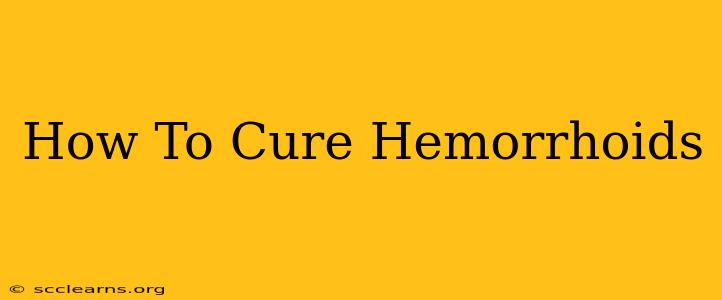Hemorrhoids, also known as piles, are swollen veins in the anus and rectum that can cause discomfort, pain, and bleeding. While many cases resolve on their own, understanding how to effectively manage and potentially cure hemorrhoids is crucial for your comfort and well-being. This comprehensive guide explores various treatment options, lifestyle changes, and when to seek professional medical advice.
Understanding Hemorrhoids: Types and Symptoms
Hemorrhoids are classified as either internal (located inside the rectum) or external (located under the skin around the anus). Symptoms vary depending on the type and severity:
- Internal Hemorrhoids: Often asymptomatic in early stages. As they worsen, they may cause painless bleeding during bowel movements, or prolapse (bulge out of the anus).
- External Hemorrhoids: Can cause intense itching, pain, and swelling. A blood clot can form within an external hemorrhoid (thrombosed hemorrhoid), causing significant pain.
Common Symptoms Across Both Types:
- Bright red blood during bowel movements
- Itching and irritation in the anal area
- Pain and discomfort, especially during bowel movements
- Swelling or lumps around the anus
- Mucus discharge
Home Remedies and Lifestyle Changes for Hemorrhoid Relief
Many home remedies can alleviate hemorrhoid symptoms and promote healing. These methods focus on softening stools, reducing inflammation, and improving overall bowel health:
1. High-Fiber Diet: The Foundation of Hemorrhoid Management
A diet rich in fiber is paramount. Fiber adds bulk to your stool, making it easier to pass and reducing strain on your rectum and anus. Increase your intake of:
- Fruits: Berries, apples, bananas
- Vegetables: Broccoli, spinach, carrots
- Whole grains: Oats, brown rice, whole-wheat bread
- Legumes: Beans, lentils
2. Hydration is Key: Drink Plenty of Water
Adequate water intake softens stools, preventing constipation—a major contributor to hemorrhoid development. Aim for at least eight glasses of water daily.
3. Over-the-Counter Treatments
Several over-the-counter (OTC) medications can provide relief:
- Creams and ointments: Contain ingredients like hydrocortisone to reduce inflammation and itching.
- Suppositories: Can help soothe irritated tissues.
- Pain relievers: Ibuprofen or acetaminophen can help manage pain.
Important Note: Always follow the instructions on OTC medication packaging.
4. Sitz Baths: Soothe Inflammation
Soaking in a warm sitz bath (a shallow bath that fills only your hips and buttocks) for 10-15 minutes several times a day can significantly ease pain and inflammation.
5. Topical Anesthetics: Temporary Pain Relief
Topical anesthetics, available OTC, can provide temporary pain relief.
Medical Treatments for Hemorrhoids
If home remedies fail to provide relief, or if your symptoms are severe, consult a doctor. Medical treatments for hemorrhoids include:
- Rubber band ligation: Cutting off the blood supply to the hemorrhoid, causing it to shrink and fall off.
- Sclerotherapy: Injecting a solution into the hemorrhoid to shrink it.
- Hemorrhoidectomy: Surgical removal of the hemorrhoid. This is typically reserved for severe cases.
- Coagulation techniques: Using heat, laser, or infrared light to destroy hemorrhoid tissue.
Preventing Hemorrhoids: Proactive Steps
Preventing hemorrhoids involves adopting healthy lifestyle habits:
- Maintain a high-fiber diet.
- Drink plenty of fluids.
- Avoid straining during bowel movements.
- Exercise regularly.
- Maintain a healthy weight.
- Avoid prolonged sitting or standing.
When to See a Doctor
Consult a doctor if:
- You experience severe pain.
- You have bright red blood in your stool.
- You notice significant swelling or a large lump.
- Home remedies haven't provided relief after several days.
- You have persistent symptoms.
This information is for educational purposes only and does not constitute medical advice. Always consult a healthcare professional for diagnosis and treatment of any medical condition. They can assess your specific situation and recommend the most appropriate course of action.

